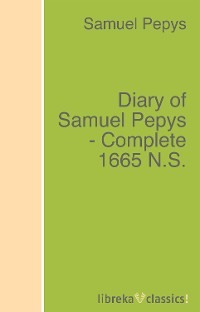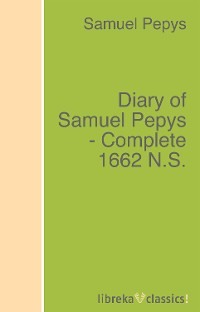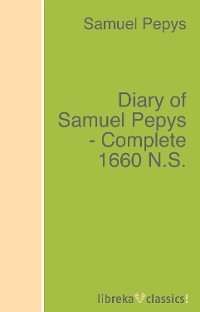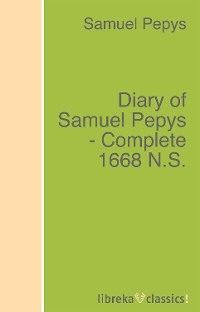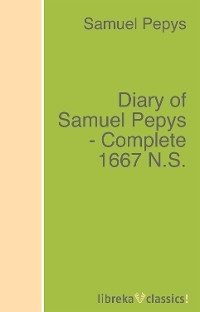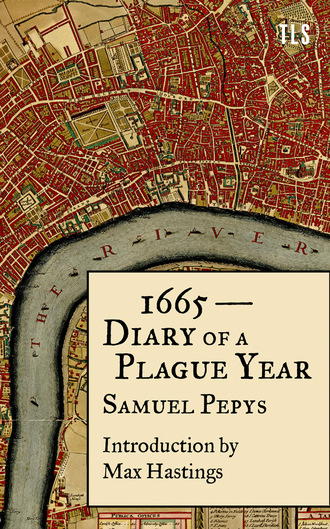
1665 – Diary of a Plague Year
19th (Lord’s day). Mr. Povy sent his coach for me betimes, and I to him, and there to our great trouble do find that my Lord Fitzharding do appear for Mr. Brunkard
[Henry Brouncker, younger brother of William, Viscount Brouncker, President of the Royal Society. He was Groom of the Bedchamber to the Duke of York, and succeeded to the office of Cofferer on the death of William Ashburnham in 1671. His character was bad, and his conduct in the sea-fight of 1665 was impugned. He was expelled from the House of Commons, but succeeded to his brother’s title in 1684. He died in January, 1687.]
to be Paymaster upon Povy’s going out, by a former promise of the Duke’s, and offering to give as much as any for it. This put us all into a great dump, and so we went to Creed’s new lodging in the Mewes, and there we found Creed with his parrot upon his shoulder, which struck Mr. Povy coming by just by the eye, very deep, which, had it hit his eye, had put it out. This a while troubled us, but not proving very bad, we to our business consulting what to do; at last resolved, and I to Mr. Coventry, and there had his most friendly and ingenuous advice, advising me not to decline the thing, it being that that will bring me to be known to great persons, while now I am buried among three or four of us, says he, in the Navy; but do not make a declared opposition to my Lord Fitzharding. Thence I to Creed, and walked talking in the Park an hour with him, and then to my Lord Sandwich’s to dinner, and after dinner to Mr. Povy’s, who has been with the Duke of York, and, by the mediation of Mr. Coventry, the Duke told him that the business shall go on, and he will take off Brunkard, and my Lord Fitzharding is quiet too. But to see the mischief, I hear that Sir G. Carteret did not seem pleased, but said nothing when he heard me proposed to come in Povy’s room, which may learn me to distinguish between that man that is a man’s true and false friend. Being very glad of this news Mr. Povy and I in his coach to Hyde Park, being the first day of the Tour there, where many brave ladies. Among others, Castlemayne lay impudently upon her back in her coach asleep, with her mouth open. There was also my Lady Kerneguy,
[Daughter of William, Duke of Hamilton, wife of Lord Carnegy, who became Earl of Southesk on his father’s death. She is frequently mentioned in the Memoires de Grammont, and in the letters of the second Earl of Chesterfield. – B.]
once my Lady Anne Hambleton, that is said to have given the Duke a clap upon his first coming over. Here I saw Sir J. Lawson’s daughter and husband, a fine couple, and also Mr. Southwell and his new lady, very pretty. Thence back, putting in at Dr. Whore’s, where I saw his lady, a very fine woman. So home, and thither by my desire comes by and by Creed and lay with me, very merry and full of discourse what to do tomorrow, and the conveniences that will attend my having of this place, and I do think they may be very great.
20th. Up, Creed and I, and had Mr. Povy’s coach sent for us, and we to his house where we did some business in order to the work of this day. Povy and I to my Lord Sandwich, who tells me that the Duke is not only a friend to the business, but to me, in terms of the greatest love and respect and value of me that can be thought, which overjoys me. Thence to St. James’s, and there was in great doubt of Brunkard, but at last I hear that Brunkard desists. The Duke did direct Secretary Bennet, who was there, to declare his mind to the Tangier Committee, that he approves of me for Treasurer; and with a character of me to be a man whose industry and discretion he would trust soon as any man’s in England: and did the like to my Lord Sandwich. So to White-hall to the Committee of Tangier, where there were present my Lord of Albemarle, my Lord Peterborough, Sandwich, Berkeley, Fitzharding, Secretary Bennet, Sir Thomas Ingram, Sir John Lawson, Povy and I – where, after other business, Povy did declare his business very handsomely; that he was sorry he had been so unhappy in his accounts, as not to give their Lordships the satisfaction he intended, and that he was sure his accounts are right, and continues to submit them to examination, and is ready to lay down in ready money the fault of his account; and that for the future, that the work might be better done and with more quiet to him, he desired, by approbation of the Duke, he might resign his place to Mr. Pepys. Whereupon, Secretary Bennet did deliver the Duke’s command, which was received with great content and allowance beyond expectation; the Secretary repeating also the Duke’s character of me. And I could discern my Lord Fitzharding was well pleased with me, and signified full satisfaction, and whispered something seriously of me to the Secretary. And there I received their constitution under all their hands presently so that I am already confirmed their Treasurer, and put into a condition of striking of tallies;
[The practice of striking tallies at the Exchequer was a curious survival of an ancient method of keeping accounts. The method adopted is described in Hubert Hall’s Antiquities and Curiosities of the Exchequer, 1891. The following account of the use of tallies, so frequently alluded to in the Diary, was supplied by Lord Braybrooke. Formerly accounts were kept, and large sums of money paid and received, by the King’s Exchequer, with little other form than the exchange or delivery of tallies, pieces of wood notched or scored, corresponding blocks being kept by the parties to the account; and from this usage one of the head officers of the Exchequer was called the tallier, or teller. These tallies were often negotiable; Adam Smith, in his Wealth of Nations, book ii., ch. xi., says that “in 1696 tallies had been at forty, and fifty, and sixty per cent discount, and bank-notes at twenty per cent.” The system of tallies was discontinued in 1824; and the destruction of the old Houses of Parliament, in the night of October 16th, 1834, is thought to have been occasioned by the overheating of the flues, when the furnaces were employed to consume the tallies rendered useless by the alteration in the mode of keeping the Exchequer accounts.]
and all without one harsh word or word of dislike, but quite the contrary; which is a good fortune beyond all imagination. Here we rose, and Povy and Creed and I, all full of joy, thence to dinner, they setting me down at Sir J. Winter’s, by promise, and dined with him; and a worthy fine man he seems to be, and of good discourse. Our business was to discourse of supplying the King with iron for anchors, if it can be judged good enough, and a fine thing it is to see myself come to the condition of being received by persons of this rank, he being, and having long been, Secretary to the Queen-Mother. Thence to Povy’s, and there sat and considered of business a little and then home, where late at it, W. Howe being with me about his business of accounts for his money laid out in the fleet, and he gone, I home to supper and to bed. News is this day come of Captain Allen’s being come home from the Straits, as far as Portland, with eleven of the King’s ships, and about twenty-two of merchantmen.
21st. Up, and my tailor coming to me, did consult all my wardrobe how to order my clothes against next summer. Then to the office, where busy all the morning. At noon to the ’Change, and brought home Mr. Andrews, and there with Mr. Sheply dined, and very merry and a good dinner. Thence to Mr. Povy’s to discourse about settling our business of Treasurer, and I think all things will go very fair between us and to my content, but the more I see the more silly the man seems to me. Thence by coach to the Mewes, but Creed was not there. In our way the coach drove through a lane by Drury Lane, where abundance of loose women stood at the doors, which, God forgive me, did put evil thoughts in me, but proceeded no further, blessed be God. So home, and late at my office, then home and there found a couple of state cups, very large, coming, I suppose each to about £6 a piece, from Burrows the slopseller.
22nd. Up, and to Mr. Povy’s about our business, and thence I to see Sir Philip Warwicke, but could not meet with him. So to Mr. Coventry, whose profession of love and esteem for me to myself was so large and free that I never could expect or wish for more, nor could have it from any man in England, that I should value it more. Thence to Mr. Povy’s, and with Creed to the ’Change and to my house, but, it being washing day, dined not at home, but took him (I being invited) to Mr. Hubland’s, the merchant, where Sir William Petty, and abundance of most ingenious men, owners and freighters of the Experiment, now going with her two bodies to sea. Most excellent discourse. Among others, Sir William Petty did tell me that in good earnest he has in his will left such parts of his estate to him that could invent such and such things. As among others, that could discover truly the way of milk coming into the breasts of a woman; and he that could invent proper characters to express to another the mixture of relishes and tastes. And says, that to him that invents gold, he gives nothing for the philosopher’s stone; “for,” says he “they that find out that will be able to pay themselves. But,” says he, “by this means it is better than to give to a lecture; for here my executors, that must part with this, will be sure to be well convinced of the invention before they do part with their money.” After dinner Mr. Hill took me with Mrs. Hubland, who is a fine gentlewoman, into another room, and there made her sing, which she do very well, to my great content. Then to Gresham College, and there did see a kitling killed almost quite, but that we could not quite kill her, with sucking away the air out of a receiver wherein she was put, and then the air being let in upon her revives her immediately;
[“Two experiments were made for the finding out a way to breathe under water, useful for divers.” The first was on a bird and the second on “a kitling” [kitten] (Birch’s History, vol. ii., p. 25).]
nay, and this air is to be made by putting together a liquor and some body that ferments, the steam of that do do the work. Thence home, and thence to White-hall, where the house full of the Duke’s going tomorrow, and thence to St. James’s, wherein these things fell out: (1) I saw the Duke, kissed his hand, and had his most kind expressions of his value and opinion of me, which comforted me above all things in the world; (2) the like from Mr. Coventry most heartily and affectionately; (3) saw, among other fine ladies, Mrs. Middleton,
[Jane, daughter to Sir Robert Needham, is frequently mentioned in the Grammont Memoirs, and Evelyn calls her “that famous and indeed incomparable beauty” (Diary, August 2nd, 1683). Her portrait is in the Royal Collection amongst the beauties of Charles II’s Court. Sir Robert Needham was related to John Evelyn.]
a very great beauty I never knew or heard of before; (4) I saw Waller the poet, whom I never saw before. So, very late, by coach home with W. Penn, who was there. To supper and to bed, with my heart at rest, and my head very busy thinking of my several matters now on foot, the new comfort of my old Navy business, and the new one of my employment on Tangier.
23rd. Up and to my Lord Sandwich, who follows the Duke this day by water down to the Hope, where the Prince lies. He received me, busy as he was, with mighty kindness and joy at my promotions; telling me most largely how the Duke has expressed on all occasions his good opinion of my service and love for me. I paid my thanks and acknowledgement to him; and so back home, where at the office all the morning. At noon to the ’Change. Home, and Lewellin dined with me. Thence abroad, carried my wife to Westminster by coach, I to the Swan, Herbert’s, and there had much of the good company of Sarah and to my wish, and then to see Mrs. Martin, who was very kind; three weeks of her month of lying in is over. So took up my wife and home, and at my office a while, and thence to supper and to bed. Great talk of noises of guns heard at Deal, but nothing particularly whether in earnest or not.
24th. Up betimes, and by agreement to the Globe tavern in Fleet Street to Mr. Clerke, my solicitor, about the business of my uncle’s accounts, and we went with one Jefferys to one of the Barons (Spelman), and there my accounts were declared and I sworn to the truth thereof to my knowledge, and so I shall after a few formalities be cleared of all. Thence to Povy’s, and there delivered him his letters of greatest import to him that is possible, yet dropped by young Bland, just come from Tangier, upon the road by Sittingburne, taken up and sent to Mr. Pett, at Chatham. Thus everything done by Povy is done with a fatal folly and neglect. Then to our discourse with him, Creed, Mr. Viner, myself and Poyntz about the business of the Workhouse at Clerkenwell, and after dinner went thither and saw all the works there, and did also consult the Act concerning the business and other papers in order to our coming in to undertake it with Povy, the management of the House, but I do not think we can safely meddle with it, at least I, unless I had time to look after it myself, but the thing is very ingenious and laudable. Thence to my Lady Sandwich’s, where my wife all this day, having kept Good Friday very strict with fasting. Here we supped, and talked very merry. My Lady alone with me, very earnest about Sir G. Carteret’s son, with whom I perceive they do desire my Lady Jemimah may be matched. Thence home and to my office, and then to bed.
25th (Lady day). Up betimes and to my office, where all the morning. At noon dined alone with Sir W. Batten, where great discourse of Sir W. Penn, Sir W. Batten being, I perceive, quite out of love with him, thinking him too great and too high, and began to talk that the world do question his courage, upon which I told him plainly I have been told that he was articled against for it, and that Sir H. Vane was his great friend therein. This he was, I perceive, glad to hear. Thence to the office, and there very late, very busy, to my great content. This afternoon of a sudden is come home Sir W. Penn from the fleet, but upon what score I know not. Late home to supper and to bed.
26th (Lord’s day and Easter day). Up (and with my wife, who has not been at church a month or two) to church. At noon home to dinner, my wife and I (Mercer staying to the Sacrament) alone. This is the day seven years which, by the blessing of God, I have survived of my being cut of the stone, and am now in very perfect good health and have long been; and though the last winter has been as hard a winter as any have been these many years, yet I never was better in my life, nor have not, these ten years, gone cool in the summer than I have done all this winter, wearing only a doublet, and a waistcoat cut open on the back; abroad, a cloak and within doors a coat I slipped on. Now I am at a loss to know whether it be my hare’s foot which is my preservative against wind, for I never had a fit of the collique since I wore it, and nothing but wind brings me pain, and the carrying away of wind takes away my pain, or my keeping my back cool; for when I do lie longer than ordinary upon my back in bed, my water the next morning is very hot, or whether it be my taking of a pill of turpentine every morning, which keeps me always loose, or all together, but this I know, with thanks to God Almighty, that I am now as well as ever I can wish or desire to be, having now and then little grudgings of wind, that brings me a little pain, but it is over presently, only I do find that my back grows very weak, that I cannot stoop to write or tell money without sitting but I have pain for a good while after it. Yet a week or two ago I had one day’s great pain; but it was upon my getting a bruise on one of my testicles, and then I did void two small stones, without pain though, and, upon my going to bed and bearing up of my testicles, I was well the next. But I did observe that my sitting with my back to the fire at the office did then, as it do at all times, make my back ache, and my water hot, and brings me some pain. I sent yesterday an invitation to Mrs. Turner and her family to come to keep this day with me, which she granted, but afterward sent me word that it being Sunday and Easter day she desired to choose another and put off this. Which I was willing enough to do; and so put it off as to this day, and will leave it to my own convenience when to choose another, and perhaps shall escape a feast by it. At my office all the afternoon drawing up my agreement with Mr. Povy for me to sign to him tomorrow morning. In the evening spent an hour in the garden walking with Sir J. Minnes, talking of the Chest business, wherein Sir W. Batten deals so unfairly, wherein the old man is very hot for the present, but that zeal will not last nor is to be trusted. So home to supper, prayers, and to bed.
27th. Up betimes to Mr. Povy’s, and there did sign and seal my agreement with him about my place of being Treasurer for Tangier, it being the greatest part of it drawn out of a draft of his own drawing up, only I have added something here and there in favour of myself. Thence to the Duke of Albemarle, the first time that we officers of the Navy have waited upon him since the Duke of York’s going, who has deputed him to be Admiral in his absence. And I find him a quiet heavy man, that will help business when he can, and hinder nothing, and am very well pleased with our attendance on him. I did afterwards alone give him thanks for his favour to me about my Tangier business, which he received kindly, and did speak much of his esteem of me. Thence, and did the same to Sir H. Bennet, who did the like to me very fully, and did give me all his letters lately come from thence for me to read, which I returned in the afternoon to him. Thence to Mrs. Martin, who, though her husband is gone away, as he writes, like a fool into France, yet is as simple and wanton as ever she was, with much I made myself merry and away. So to my Lord Peterborough’s, where Povy, Creed, Williamson, Auditor Beale, and myself, and mighty merry to see how plainly my Lord and Povy did abuse one another about their accounts, each thinking the other a fool, and I thinking they were not either of them, in that point, much in the wrong, though in everything, and even in this manner of reproaching one another, very witty and pleasant. Among other things, we had here the genteelest dinner and the neatest house that I have seen many a day, and the latter beyond anything I ever saw in a nobleman’s house. Thence visited my Lord Berkeley, and did sit discoursing with him in his chamber a good while, and [he] mighty friendly to me about the same business of Tangier. From that to other discourse of the times and the want of money, and he said that the Parliament must be called again soon, and more money raised, not by tax, for he said he believed the people could not pay it, but he would have either a general excise upon everything, or else that every city incorporate should pay a toll into the King’s revenue, as he says it is in all the cities in the world; for here a citizen has no more laid on them than their neighbours in the country, whereas, as a city, it ought to pay considerably to the King for their charter; but I fear this will breed ill blood. Thence to Povy, and after a little talk home to my office late. Then to supper and to bed.
28th. Up betimes and to the office, where we sat all the morning, and I did most of the business there, God wot. Then to the ’Change, and thence to the Coffee-house with Sir W. Warren, where much good discourse for us both till 4 o’clock with great pleasure and content, and then parted and I home to dinner, having eat nothing, and so to my office. At night supped with my wife at Sir W. Penn’s, who is to go back for good and all to the fleet tomorrow. Took leave and to my office, where till 12 at night, and then home to bed.
29th. Up betimes and to Povy’s, where a good while talking about our business; thence abroad into the City, but upon his tally could not get any money in Lombard Street, through the disrepute which he suffers, I perceive, upon his giving up his place, which people think was not choice, but necessity, as indeed it was. So back to his house, after we had been at my house to taste my wine, but my wife being abroad nobody could come at it, and so we were defeated. To his house, and before dinner he and I did discourse of the business of freight, wherein I am so much concerned, above £100 for myself, and in my over hasty making a bill out for the rest for him, but he resolves to move Creed in it, which troubled me much; and Creed by and by comes, and after dinner he did, but in the most cunning ingenious manner, do his business with Creed by bringing it in by the by, that the most subtle man in the world could never have done it better, and I must say that he is a most witty, cunning man and one that I [am] most afeard of in my conversation, though in all serious matters of business the eeriest fool that ever I met with. The bill was produced and a copy given Creed, whereupon he wrote his Intratur upon the original, and I hope it will pass; at least I am now put to it that I must stand by it and justify it, but I pray God it may never come to that test. Thence between vexed and joyed, not knowing what yet to make of it, home, calling for my Lord Cooke’s 3 volumes at my bookseller’s, and so home, where I found a new cook-maid, her name is [Alice], that promises very little. So to my office, where late about drawing up a proposal for Captain Taylor, for him to deliver to the City about his building the new ship, which I have done well, and I hope will do the business, and so home to supper and to bed.
30th. Up, and to my Lord Ashly, but did nothing, and to Sir Philip Warwicke and spoke with him about business, and so back to the office, where all the morning. At noon home to dinner, and thence to the Tangier Committee, where, Lord! to see how they did run into the giving of Sir J. Lawson (who is come to town today to get this business done) £4,000 about his Mole business, and were going to give him 4s per yard more, which arises in the whole Mole to £36,000, is a strange thing, but the latter by chance was stopped, the former was given. Thence to see Mrs. Martin, whose husband being it seems gone away, and as she is informed he has another woman whom he uses, and has long done, as a wife, she is mighty reserved and resolved to keep herself so till the return of her husband, which a pleasant thing to think of her. Thence home, and to my office, where late, and to bed.
31st. Up betimes and walked to my Lord Ashly, and there with Creed after long waiting spoke with him, and was civilly used by him; thence to Sir Philip Warwicke, and then to visit my Lord of Falmouth, who did also receive me pretty civilly, but not as I expected; he, I perceive, believing that I had undertaken to justify Povy’s accounts, taking them upon myself, but I rectified him therein. So to my Lady Sandwich’s to dinner, and up to her chamber after dinner, and there discoursed about Sir G. Carteret’s son, in proposition between us two for my Lady Jemimah. So to Povy, and with him spent the afternoon very busy, till I was weary of following this and neglecting my Navy business. So at night called my wife at my Lady’s, and so home. To my office and there made up my month’s account, which, God be praised! rose to £1,300 – which I bless God for. So after 12 o’clock home to supper and to bed. I find Creed mightily transported by my Lord of Falmouth’s kind words to him, and saying that he has a place in his intention for him, which he believes will be considerable. A witty man he is in every respect, but of no good nature, nor a man ordinarily to be dealt with. My Lady Castlemayne is sick again, people think, slipping her filly.
Конец ознакомительного фрагмента.
Текст предоставлен ООО «ЛитРес».
Прочитайте эту книгу целиком, купив полную легальную версию на ЛитРес.
Безопасно оплатить книгу можно банковской картой Visa, MasterCard, Maestro, со счета мобильного телефона, с платежного терминала, в салоне МТС или Связной, через PayPal, WebMoney, Яндекс.Деньги, QIWI Кошелек, бонусными картами или другим удобным Вам способом.


